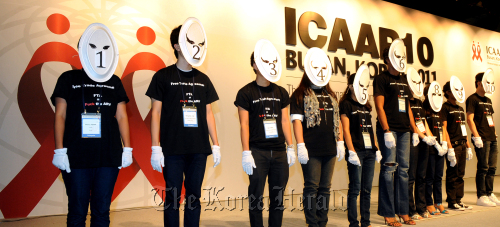Experts say continuing stigma makes medical situation worse
BUSAN ― Despite advancements in treatment, the struggles of people living with HIV/AIDS will never end as long as stigma and discrimination against them continues, activists and medical researchers said during an international forum here last week.
They said that this type of social climate increased the vulnerability of what they called “key affected populations,” making it even more difficult for them to access treatment, care and support.
 |
Young people from key affected populations call for more attention to their human rights during a plenary session of The 10th International Congress on AIDS in Asia and the Pacific at BEXCO in Busan on Saturday. (Park Hyun-koo/The Korea Herald) |
The 10th International Congress on AIDS in Asia and the Pacific brought together some 2,500 people from more than 60 countries. The five-day biennial gathering ends on Tuesday.
“People just don’t want to take simple medications because they are just sick and tired of (the stigma). They are not even able to speak out. Stigma comes from within yourself because you are scared of what the others say,” said Asavari Herwadkar, a physician from Mumbai.
“I am in the medical profession, but it is not enough just to give medical (support). It is much deeper. It is psychological, social and spiritual. Those factors play bigger roles than medical aspects.”
Park Kwang-seo, who leads the activist group “Love for One,” said that AIDS patients feel most hopeless when they are rejected by doctors and other healthcare providers, who they consider the “last ones to fall back on.”
Park, 39, established the group to enhance the human rights of those with the disease in 1999 ― five years after he himself tested HIV-positive.
“People with HIV and AIDS go to the hospital, hoping that they will not face any of the discrimination still rampant in society, and that the doctors would give them the mental strength to carry on their lives,” he said.
“But looking at the doctors’ reluctance to treat them, their trust and confidence in them is broken with some refusing to go see their doctors and take antiviral drugs.”
Another society faced with the challenge of overcoming the stigma surrounding the disease is Afghanistan, with 570 HIV-infected people.
“There are two issues regarding the stigma. One is a religious issue and the other is a cultural one. Religiously, there is no stigma against the problem, but culturally, because they are associated with sexual practices … that is why they are seen as not very good,” said Dr. Saliab Ayubi, health program officer of the Afghanistan Delegation of the International Federation of the Red Cross and Red Crescent Societies.
Rev. Michael Schuenemeyer, an executive director of the United Church of Christ HIV & AIDS Network in Ohio, said people should provide more “compassionate” attention to HIV patients.
“We should not immediately jump to judgment. Health care, particularly in terms of public health care, has to be done without judgment. That is the first step. And then, it is through the listening of people’s stories and responding with compassion. We have to treat ourselves as human beings,” he said.
Rev. JP Mokgethi-Heath of South Africa said that discrimination makes things worse for those infected with HIV.
“In South Africa, as an example, in terms of sexuality, marriage between two people of the same sex is legal. But there is within society a great discrimination against people who are lesbian or gay,” he said.
An extreme example of prejudice against homosexuals in conservative societies is that “lesbian women are identified and gang-raped by men” who believe women should have sex with men, not women, he said. Worse, many lesbian women become infected with HIV as a result of such brutal assaults.
Despite campaigns, the stigma around the disease dies hard with many people still associating AIDS with promiscuous sexual activities and immoral behavior.
“Such prejudices stem from our society’s ignorance of the disease. People do not pay attention to it as they think it only concerns special groups of people such as homosexuals, sex workers, foreigners and those in the poor African states,” said Youn Gabriel, who lives with HIV.
By Song Sang-ho, Korea Herald correspondent (
sshluck@heraldcorp.com)






![[Herald Interview] 'Trump will use tariffs as first line of defense for American manufacturing'](http://res.heraldm.com/phpwas/restmb_idxmake.php?idx=644&simg=/content/image/2024/11/26/20241126050017_0.jpg)
![[Exclusive] Hyundai Mobis eyes closer ties with BYD](http://res.heraldm.com/phpwas/restmb_idxmake.php?idx=644&simg=/content/image/2024/11/25/20241125050044_0.jpg)
